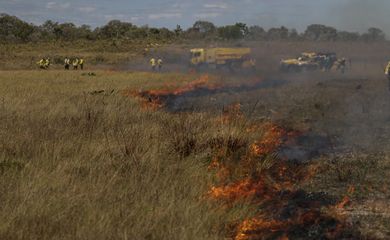Brazil: Study proposes halting deforestation for zero greenhouse gases

A study conducted by the University of Oxford emphasizes the crucial role of ending legal and illegal deforestation, coupled with substantial reforestation efforts, as imperative measures for Brazil to fulfill its dedication to achieving zero net greenhouse gas emissions by 2050—one of the commitments the nation has undertaken globally to address the climate crisis. 

This commitment, known as the net-zero target, requires a nation to offset all emitted gases by those it can absorb, primarily through natural processes such as forest ecosystems. Greenhouse gases like carbon dioxide (CO²) and methane (CH4) are key contributors to global warming.
The research underscores that, in Brazil's context, solutions rooted in nature itself prove more effective than costly technological interventions like carbon capture.
Despite Brazil's advantageous energy matrix, with 87 percent sourced from low-polluting options such as biomass, hydroelectric, wind, and solar power, the country stands as the sixth-largest emitter globally, behind only China, the United States, India, Russia, and Japan.
In Brazil, the primary culprit is not the direct combustion of fossil fuels but rather the nation's land utilization, notably deforestation. Research indicates that land use accounted for 46 percent of greenhouse gas emissions in 2020, with 90 percent attributed to deforestation. The agricultural sector stands as the second major contributor, responsible for 25 percent of global warming gas emissions.
Aline Soterroni, a Brazilian researcher from the Department of Biology at the University of Oxford, highlighted, "Unlike the global trend where 75 percent of emissions arise from the energy sector, in Brazil, 75 percent emanate from activities associated with land use and agriculture."
Legal deforestation
In this context, the study contends that even with the proper application of the Forest Code, the potential reduction in net emissions by 2050 would only be 38 percent. This limitation arises from the study's estimation that legal deforestation, sanctioned by the Forest Code, might encompass 32 million hectares by 2050—a landmass equivalent to the size of the state of Maranhão. Notably, nearly half (48%) of this legally sanctioned deforestation is projected to occur in the Cerrado biome.
Soterroni remarked, "Mitigating emissions in agriculture and energy poses significant challenges. Therefore, the most promising avenue for Brazil lies within the realm of the land use sector."
The study proposes a solution, calculated through mathematical models, advocating for complete cessation of both legal and illegal deforestation, coupled with the reforestation of 35 million hectares. Implementing this strategy would result in a 62 percent achievement of the zero-emission target.
Agriculture
The study further assessed the potential impact on beef and soybean production under the scenario of ceasing all deforestation, adhering to the Forest Code, and implementing large-scale reforestation. Notably, the research revealed that nearly 98 percent of deforested areas in Brazil between 2019 and 2021 were directly or indirectly linked to agricultural activities.
Based on mathematical projections, the adoption of these measures could lead to an 8 percent to 17 percent decline in beef production and a 3 percent to 10 percent reduction in soybean production by 2050. Aline Soterroni emphasizes that this is a modest decrease in light of the valuable ecosystem services and biodiversity protection the scenario would yield, crucial for adaptation and resilience to climate change. She asserts that Brazil can sustain its production and export activities while adhering to a zero-deforestation approach.
The Brazilian environmental scientist underscored the need to enhance productivity, particularly in cattle farming, where expansive land usage for a limited number of cattle prevails. Concurrently serving as a contributing factor to deforestation, agriculture faces the imminent threat of substantial impacts from climate change.
"Brazilian agriculture relies heavily on nature's ecosystem services, with 90 percent of agricultural practices being rain-fed, lacking irrigation. Therefore, preserving the balance of ecosystems is crucial for the future sustainability of Brazilian agriculture. To achieve this, ending deforestation strategically becomes imperative, as there is no need to deforest to sustain production," Soterroni explained.
She pointed out that Brazil has not yet included the goal of achieving zero net greenhouse gas emissions by 2050 in national plans and legislation. "You need a plan with intermediate targets, with emission targets for each sector, and to monitor this with ambition," she concluded.






